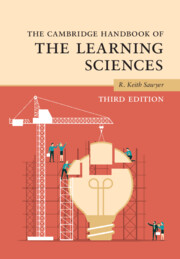Book contents
- The Cambridge Handbook of the Learning Sciences
- The Cambridge Handbook of the Learning Sciences
- Copyright page
- Contents
- Figures
- Tables
- Contributors
- Preface
- 1 An Introduction to the Learning Sciences
- Part I Foundations
- Part II Methodologies
- Part III Grounding Technology in the Learning Sciences
- Part IV Learning Together
- 19 Knowledge Building and Knowledge Creation
- 20 Computer-Supported Collaborative Learning
- 21 Arguing to Learn
- 22 Informal Learning in Museums
- Part V Learning Disciplinary Knowledge
- Part VI Moving Learning Sciences Research into the Classroom
- Index
- References
20 - Computer-Supported Collaborative Learning
from Part IV - Learning Together
Published online by Cambridge University Press: 14 March 2022
- The Cambridge Handbook of the Learning Sciences
- The Cambridge Handbook of the Learning Sciences
- Copyright page
- Contents
- Figures
- Tables
- Contributors
- Preface
- 1 An Introduction to the Learning Sciences
- Part I Foundations
- Part II Methodologies
- Part III Grounding Technology in the Learning Sciences
- Part IV Learning Together
- 19 Knowledge Building and Knowledge Creation
- 20 Computer-Supported Collaborative Learning
- 21 Arguing to Learn
- 22 Informal Learning in Museums
- Part V Learning Disciplinary Knowledge
- Part VI Moving Learning Sciences Research into the Classroom
- Index
- References
Summary
In its broadest definition, computer-supported collaborative learning (CSCL) is any learning that involves two or more learners as well as one or more computers. CSCL research studies how collaboration contributes to learning and how computer technology can facilitate collaborative learning. This chapter discusses CSCL in terms of four conceptions: (1) collaborative knowledge building; (2) dialogic interaction; (3) intersubjective meaning making; (4) group cognition. CSCL research demonstrates that collaboration among students – when well-designed to scaffold student interactions – is more effective than teachers delivering information to students through a recorded lecture or a synchronous video meeting. This chapter reviews major themes in CSCL, including: empirical studies of cooperative learning in groups; theoretical explanations of learning as an emergent, collective phenomenon; conceptions of knowledge as interactions between learners, rather than as mental representations in student’s heads; and the use of interaction analysis to study moment-to-moment collaborations.
Keywords
Information
- Type
- Chapter
- Information
- The Cambridge Handbook of the Learning Sciences , pp. 406 - 427Publisher: Cambridge University PressPrint publication year: 2022
References
Accessibility standard: Unknown
Why this information is here
This section outlines the accessibility features of this content - including support for screen readers, full keyboard navigation and high-contrast display options. This may not be relevant for you.Accessibility Information
- 14
- Cited by
